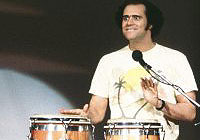|
|
|
|
Man
on the Moon
|
 |
|
Jim Carrey often comes across as an actor who performs solely for himself, oblivious to other cast members, or even the requirements of a script. In this, he is like many comedians – from Fatty Arbuckle to Robin Williams via Jerry Lewis – who are spectacles in themselves, whirlwinds who demolish the rational logic and order of the dull, conventional worlds around them. Carrey is perfectly cast as Andy Kaufman, a performer best known (much to his regret) as Latka in the sitcom Taxi. Kaufman pioneered a surreal form of stand-up comedy (akin to performance art) which aimed to make its spectators ask, at every moment: Is this meant to be funny? Where is this guy coming from? Man on the Moon follows Kaufman's career from his first, bemusing public appearances to the final, audiovisual message projected over his grave. Although he is surrounded by intriguing people – including his manager George Shapiro (Danny DeVito), writer Bob Zmuda (Paul Giamatti) and partner Lynne Margulies (Courtney Love) – the film is single-mindedly fixed on Kaufman and his non-stop, often inscrutable "act". There can be no doubt that this is essentially hagiography, rather than critical biography. Assembled by his friends, collaborators and admirers, it treats Kaufman with something approaching divine awe – particularly at those clumsy moments when Shapiro effuses to Kaufman's face about his "genius". Little is allowed to blemish the smooth surface of this paean. A brief scene where Margulies warns Kaufman not to exploit her as a "prop" in his public stunts, or passing allusions to the odd place of the comedian's gross alter ego Tony Clifton within his psyche, do not fundamentally alter the film's idolatry. But, mercifully, it amounts to more than a tribute to a gifted weirdo. Director Milos Forman, like Martin Scorsese, has a peculiar fascination for the biopic – one of the most difficult and treacherous of all popular art forms. His previous film, The People vs. Larry Flynt (1996), adopted the shapeless, meandering mode of many biopics – unable to find a central theme in the many and varied incidents of an individual's life, forever lured away on fanciful tangents. Man on the Moon marks a significant improvement in biopic style – both for Forman and his writers, Scott Alexander and Larry Karaszewski (Ed Wood, 1994). What is at once frustrating and fascinating about the movie is the way it refuses to get inside Kaufman. There are no childhood traumas, no Rosebud-like keys to his adult personality. There is no privileged moment where the comedian's mask drops, and we see the transparently real individual. This may be the only Hollywood biopic of an eccentric which does not sentimentalise its hero, or show him pining, in an unguarded moment, for a normal life. Bravely, the film keeps Kaufman as a mystery from start to end. Around his performances and pranks, two themes are cleverly woven. The first is the ambiguity of Kaufman's happenings: when does the pretence stop and reality start? A little gingerly, Forman tries to make this the formal principle of his movie as well – it contains several surprising plot revelations and games which toy with the audience's ongoing assumption. The prologue (a tribute to the great '50s director Frank Tashlin) is particularly delicious. Such playfulness is almost old-fashioned, '60s art-movie material. More compelling, to my mind, is the manner in which Forman and his collaborators fix on the negative energy of Kaufman's comedy. He was a gleeful anarchist – a satirist without a clear political agenda, or indeed an obvious belief in any positive life values. Kaufman certainly targeted corporate America (its television networks, in particular) by rubbing its face in the cultural trash of wrestling, Vegas showbiz, Elvis impersonations and nonsensical humour. But the flip side of his persona – the little boy exhorting everyone to sing nursery rhymes, eat cake and go to heaven – was hardly any more comforting. Like Pee-wee Herman, Kaufman gave his pop-inspired infantilism a disquieting idiot grin. Man on the Moon has a tough job finding a sympathetic line on Kaufman's misanthropy, not to mention his constant incitements to public violence. Paradoxically, the comedian's intense commitment to transcendental meditation provides a way of understanding his apparent project. In a key scene, Kaufman asserts that "all is illusion" – both the happiness and the horror of daily, social, earthly life – and so, implicitly, his job is to confuse, outrun or tear down these illusions. Since even the self, according to Eastern philosophy, is also an illusion, the film's refusal to entertain the usual biopic clichés about Kaufman's real, private identity are, in the end, abundantly justified – and, indirectly, rather touching. another showbiz enigma: Confessions of a Dangerous Mind MORE biopics: Ali, Auto Focus, The Aviator, Basquiat, De-Lovely, Heart Like a Wheel, I Shot Andy Warhol, Kundun, The Life and Death of Peter Sellers, Malcolm X, Nixon, Pollock, What's Love Got to Do With It? MORE Carrey: The Cable Guy, Eternal Sunshine of the Spotless Mind, The Truman Show, Batman Forever, Fun with Dick and Jane, Liar Liar © Adrian Martin February 2000 |
![]()